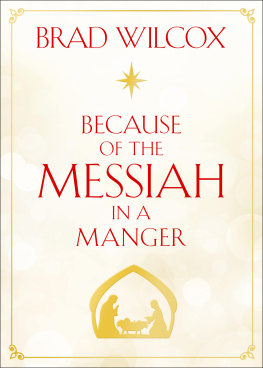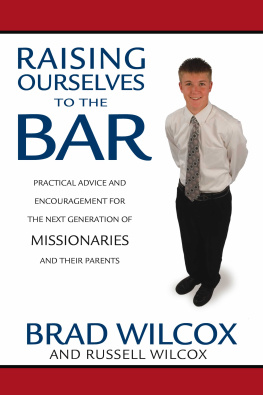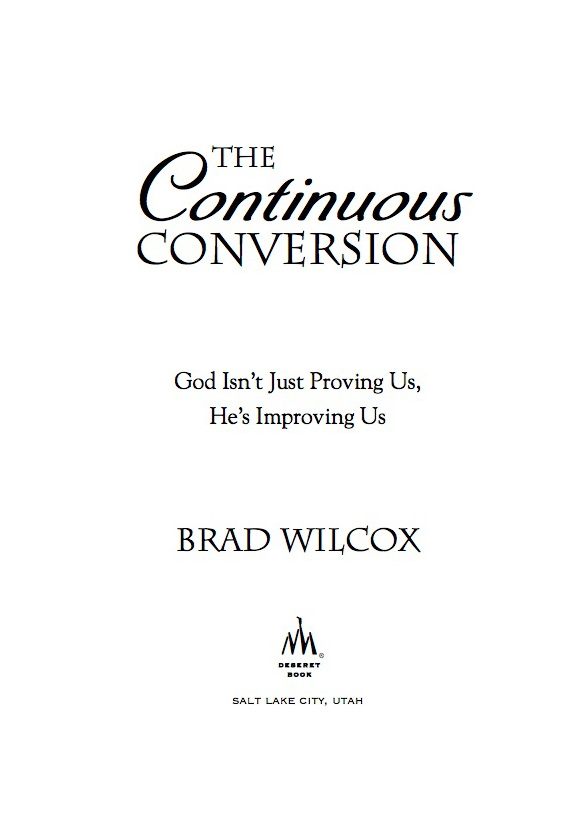2013 Brad Wilcox.
All rights reserved. No part of this book may be reproduced in any form or by any means without permission in writing from the publisher, Deseret Book Company, P.O. Box 30178, Salt Lake City Utah 84130. This work is not an official publication of The Church of Jesus Christ of Latter-day Saints. The views expressed herein are the responsibility of the author and do not necessarily represent the position of the Church or of Deseret Book. Deseret Book is a registered trademark of Deseret Book Company.
Library of Congress Cataloging-in-Publication Data
Wilcox, Brad, author.
The continuous conversion : God isnt just proving us, hes improving us / Brad Wilcox.
pages cm
Includes bibliographical references and index.
ISBN 978-1-60907-327-5 (hardbound : alk. paper)
1. AtonementThe Church of Jesus Christ of Latter-day Saints. 2. ConversionThe Church of Jesus Christ of Latter-day Saints. 3. The Church of Jesus Christ of Latter-day SaintsDoctrines. I. Title.
BX8643.A85W555 2013
234'.5dc232012047387
Printed in the United States of America
R. R. Donnelley, Crawfordsville, IN
10 9 8 7 6 5 4 3 2 1
Acknowledgments

Thanks to family members who have lovingly coached me and provided suggestions: Debi Wilcox, Wendee and Gian Rosborough, Russell and Trish Wilcox, Whitney Wilcox, David Wilcox, Leroy and Mary Lois Gunnell, and Val C. Wilcox. I appreciate support from dear friends Brett Sanders, Robert and Helen Wells, Clark Smith, and Cody Sanders (my former sixth-grade student who is now teaching me so much). Special thanks as well to others whose unique perspectives have been invaluable: Tom Allen, Ronald Shiflet, Joel Glanfield, Eric Moutsos, Daron Jones, Dale Covington, and my captive audience composed of Brad Platt, Alan Thomas, Reese Merrill, Ralph Holt, Jerry Tuttle, and George Buddy Curtis.
Thanks to Sheri Dew, Laurel Christensen, Cory Maxwell, Emily Watts, Chrislyn Barnes Woolston, and Kenny Hodges at Deseret Book. These talented and dedicated individuals long ago graduated from being professionals I admire to friends
I love.
I appreciate friends and colleagues at Brigham Young University who have blessed my life. I am indebted to Richard Young, Nancy Wentworth, Tim Morrison, Brent Top, JD Hucks, Gary Bauer, and Bruce Payne. Sharon Black in particular has always gone many extra miles to help me.
Special thanks to the general Sunday School presidencyRussell T. Osguthorpe, David M. McConkie, and Matthew O. Richardsonand to the board: Lee Tom Perry, Karl R. and Amy H. White, Ann N. Madsen, and Omar Canals. Serving with them has been a joy. I also appreciate the support of David Warner, Jeff Orr, Dale McClellan, Barbara Madsen, Megan Thurgood, Amy Christensen, and Rochelle Tolman. Their selfless work has blessed so many lives, including mine.
Introduction

Heaven is not a prize for the perfect, but the future home of all who are willing to be perfected.
I cant do this Mormon thing. Ive tried, and the expectations are just way too high. Thats what one discouraged friend told me, and she is not alone. Too many are feeling disheartened and wanting to toss in the towel.
There are young women who know they are daughters of a Heavenly Father who loves them, and they love Him. Then they graduate from high school, and the values they memorized are put to the test. They slip up. They let things go too far, and suddenly they think it is all over.
There are young men who grow up singing I hope they call me on a mission, and then they do actually grow a foot or two and begin singing a different tune. Suddenly these young men find out how easy it is to not be trustworthy, loyal, helpful, friendly, and all the rest. They mess up. They repent. They mess up again. They repent. They mess up again. By now the guilt and shame are almost unbearable. They dont dare talk to parents or bishops. Instead, they hide. Ward members ask them so often about their mission plans it becomes easier to avoid meetings altogether.
I know missionaries who beat themselves up because they are not baptizing enough or they havent been made senior companions or district leaders. They convince themselves they must not have enough faith. Other missionaries come home early and then feel like they have let everyone down. Held captive by the could haves and should haves, they find any excuse to bow out of Church activity.
Returned missionaries complete their entire missions with honor but then fall quickly back into bad habits they thought were over. They break promises made before God, angels, and witnesses, and they are convinced there is no hope for them. They say, Well, Ive blown it. There is no use in even trying anymore.
Married couples find out that marriage requires adjustments. The pressures of life mount, and stress starts taking its toll financially, spiritually, and even sexually. Mistakes are made. Walls go up. Pretty soon these husbands and wives are talking with divorce lawyers rather than with each other.
Divorced members feel forever labeled and judged. Their deep hurts are compounded with every talk or lesson given about temple sealings and eternal families. They tire of feeling single in a family church, and before long they slip away.
Add to the list those who are dealing with loneliness, depression, financial instability, or the death of a loved one. Some people hate their jobs, while others would give anything for employment. Many feel neglected, overlooked, and underappreciated.
In all of these cases there should never be just two options: being perfect or giving up. When a person is learning to play the piano, are the only options performing at Carnegie Hall or quitting? No. Growth and development take time. Learning takes practice. Discipleship is a journey, and true conversion is a continuous process.
Conversion is sometimes difficult to define because it is so multifaceted. It is not necessarily synonymous with membership in the Church or activity in the Church. Nephi wrote, After ye have gotten into this strait and narrow path, I would ask if all is done? Behold, I say unto you, Nay (2 Nephi 31:19). The journey of conversion continues long after baptism and goes deeper than attending meetings. True conversion depends on obtaining an accurate view of life, the plan of salvation, Gods love, and Christs Atonement. But it also depends on living in accordance with that knowledge in public and in private. And when behavior lags behind beliefs, conversion means experiencing for ourselves how Christs strength is perfect in our weakness (see 2 Corinthians 12:9) enabling us to continue in patience until [we] are perfected (D&C 67:13). Sometimes finding hope and motivation to keep moving forward in this conversion process is as simple as going back to core doctrines and refocusing on them through new eyes. Doctrine offers a firmer foundation than popular thinking or good advice. Clear doctrine can help us identify and categorize problems. More important, it can be a tool to help us predict, avoid, and solve them.
When I was a young boy, I enjoyed the book Charlie and the Chocolate Factory














